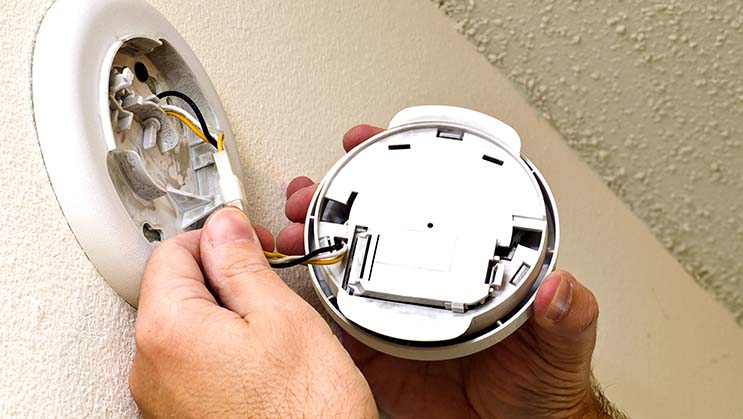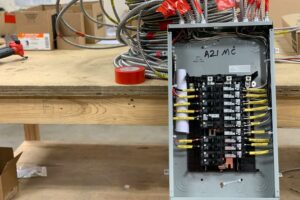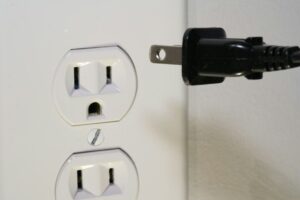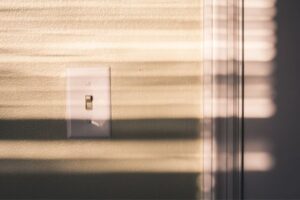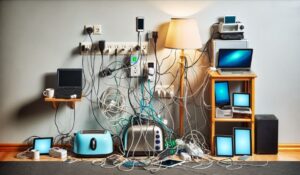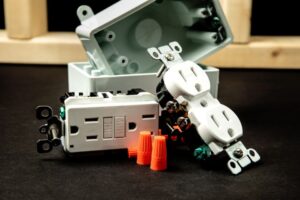In general, it is recommended to have an electrician perform the task of replacing your home’s hardwired smoke detector.
While replacing hard-wired smoke detectors can be a DIY project for those with electrical knowledge, it is important to consider the complexity of the system, wiring modifications, and safety regulations. Those who aren’t doing this kind of work regularly may be at risk of making a costly mistake if they try to do it themselves.
If you are not knowledgeable about electrical work, we recommend hiring an electrician. They can assist you in replacing your hardwired smoke alarm.
Hardwire smoke detectors vs battery operated
Smoke detectors are crucial devices for ensuring the safety of your home and loved ones. Over time, these devices may require replacement due to wear and tear or advancements in technology.
Typical battery-operated smoke detectors are stand-alone devices, whereas hardwired smoke detectors can be chained together. The catch is that replacing them or working on them is more challenging.
Hardwired smoke detectors utilize a pigtail wiring harness to connect to the building, and replacing one unit with another may or may not be an apples-to-apples replacement, especially if you’re using a unit of a different make and model than the one you had originally.
If you have hard-wired smoke detectors at home, you might be unsure if you need an electrician to replace them. As a licensed electrician, I will explain the factors that determine whether you need an electrician and provide guidance on replacing hardwired smoke detectors.
Understanding Hardwired Smoke Detectors
Before proceeding with any replacement, it is important to understand the basic components and functionality of your smoke detector system.
Hard-wired smoke alarms are an integral part of a home’s fire detection system. Unlike battery-operated smoke detectors, hardwired detectors are directly connected to the electrical system of your house.
Here are three key points to understand about hardwired smoke detectors:
- Continuous Power Source: Hardwired smoke detectors receive a constant power supply, eliminating the need for frequent battery replacements.
- Battery Backup: Many hardwired detectors come with backup batteries, ensuring functionality during power outages.
- Interconnected System: Hardwired detectors are typically interconnected, meaning that when one alarm is triggered, all detectors in the system will sound simultaneously.
It is important to note that hardwired smoke detectors still require periodic testing by using the test button and maintenance to ensure they are in proper working condition.
When to Consider Hiring an Electrician
Knowing when to consider hiring an electrician for the replacement of hardwired smoke detectors is crucial to ensure a safe and effective process. Factors such as
- Limited electrical knowledge,
- Complex interconnected systems, or
- The need for wiring modifications
These are key considerations that may warrant the expertise of a licensed electrician that will help in promoting your personal safety as well as the functionality of the system.
Expertise and Safety
If you have limited knowledge of electrical systems, it is advisable to hire a licensed electrician for the replacement. When it comes to replacing hardwired smoke detectors, hiring an electrician brings a level of expertise and safety that is essential for the task.
Electricians possess in-depth knowledge of electrical systems, ensuring that your new smoke detectors meet the required standards as they:
- Understand electrical codes and safety regulations
- Can identify any potential wiring or electrical issues, and
- Guarantee proper installation and function.
By entrusting the job to a professional, you can have peace of mind knowing that the replacement is carried out with the utmost precision and in accordance with the necessary safety protocols.
Complex Systems
If your hardwired smoke detector system is interconnected with other devices, such as a home security system or carbon monoxide detectors, it is advisable to consult an electrician for the replacement.
Complex systems require specialized knowledge to ensure that the replacement process does not disrupt the functionality of the interconnected devices. Electricians can help to:
- Assess the system’s configuration,
- Identify the appropriate wiring connections, and
- Synchronize all the components effectively.
Electricians have the expertise to navigate complex interconnected systems, ensuring that the new smoke detectors seamlessly integrate with the existing setup. By involving an electrician, you can be confident that all devices will continue to operate harmoniously, providing safety and protection for your home.
Electrical Wiring Modifications
If the replacement of hardwired smoke detectors requires electrical wiring modifications, it is strongly recommended to hire an electrician. Electrical wiring modifications can be complex and potentially hazardous if not done correctly.
Electricians have the knowledge and experience to:
- Assess your home’s electrical system,
- Make necessary modifications, and
- Ensure proper connections for the new smoke detectors.
Electricians have the expertise to safely handle tasks such as running new wiring, installing junction boxes, and adjusting the circuitry. By entrusting these modifications to an electrician, you can ensure that the replacement process is efficient, and the risk of electrical issues are minimal.
The expertise of an electrician also guarantees that any modifications are done in compliance with building codes and regulations, ensuring the safety and functionality of your smoke detector system.
Replacing Hardwired Smoke Detectors by Yourself
In some cases, replacing hardwired smoke detectors can be a pretty simple and straightforward process that you can tackle yourself. However, it is essential to take the necessary precautions and follow these 5 guidelines:
- Turn off Power: Before starting any work, turn off the power to the circuit that supplies electricity to the smoke detectors. Locate the corresponding circuit breaker in your electrical panel and switch it off.
- Detach the Old Detectors: Remove the existing smoke detectors from their mounting plates. Disconnect the wiring by loosening the screws on the wire nuts and separating the wires.
- Check Compatibility: Ensure that the new smoke detectors are compatible with your existing system. Read the manufacturer’s instructions and guidelines before making a purchase.
- Install New Detectors: Place the new detectors onto the existing mounting brackets, following the manufacturer’s instructions. Twist to secure the wires when connecting them together and securing them with wire nuts. Use electrical tape to further secure the connections.
- Test and Restore Power: After the installation, restore power to the circuit by turning on the corresponding breaker. Test the smoke detector to ensure they are functioning correctly.
Things to Remember
The safety of your home and loved ones is paramount, and smoke detectors play a vital role in alerting you to potential fire hazards. Whether you choose to replace your hardwired smoke detectors yourself or hire an electrician, prioritize following the manufacturer’s instructions and adhere to local electrical codes and regulations.
If you decide to hire an electrician, ensure they are licensed, experienced, and reputable. Request estimates and make an informed decision about who you are hiring. By taking the necessary precautions and seeking professional assistance, you can ensure your smoke detectors are replaced safely and efficiently, providing continued protection for your home.


